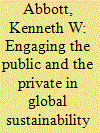|
|
|
Sort Order |
|
|
|
Items / Page
|
|
|
|
|
|
|
| Srl | Item |
| 1 |
ID:
112804


|
|
|
|
|
| Publication |
2012.
|
| Summary/Abstract |
Negotiators preparing for Rio+20 are missing an important opportunity. Private sustainability governance (PSG) is thriving: organizations created by business and civil society groups, as well as public-private partnerships, adopt and apply significant regulatory standards and undertake valuable operational activities, including pilot projects and financing. However, even though reforming the institutional framework for sustainable development is a central part of the Rio+20 agenda, negotiators are focusing almost exclusively on inter-governmental organizations such as the UN Environment Program (UNEP), the Commission for Sustainable Development and the Economic and Social Council. This public-private engagement gap isolates international governance from the energy and innovation of PSG, and impedes efforts to coordinate the bifurcated and decentralized system of sustainability governance. This article argues that states, and especially international organizations, should actively support PSG as part of the institutional framework for sustainable development, while steering private and public-private schemes towards good organizational practices and the pursuit of public goals. Engagement with PSG would help international institutions pursue their sustainability missions more effectively, promote the emergence of effective and legitimate private schemes, manage fragmentation, promote experimentation and learning, and enhance citizen participation. The article outlines two fruitful modes of engagement pioneered by UNEP: regulatory cooperation, in which international authorities engage directly with business firms, industry groups and other 'targets', influencing them to adopt more sustainable behaviors; and orchestration, in which authorities engage with intermediary organizations, such as multi-stakeholder private governance schemes, catalyzing, supporting and steering them as they seek to influence the ultimate targets of policy.
|
|
|
|
|
|
|
|
|
|
|
|
|
|
|
|
| 2 |
ID:
178119


|
|
|
|
|
| Summary/Abstract |
How do small states succeed in influencing global policies? Traditional International Relations theories highlight the vulnerability and limited capacity of small states and suggest that the scope for these states to influence global policies is limited. However, recent literature on small states in global governance has challenged this view. Studies have found that in the context of international organizations, participation in coalitions and favourable decision-making structures, among others, contribute to explaining the influence of small states in global governance. While these factors are indeed relevant, they only partly explain how small states are able to influence global policies. Drawing on in-depth qualitative research exploring the influence of small states, this article advances understandings of how small states can influence global governance and international negotiations. Focusing on one small state, the article analyses how Bhutan, through policy entrepreneur Jigme Y. Thinley, challenged fundamental ideas about what constitutes development by placing happiness on the global agenda. We contribute unique data on the influence of Bhutan and an analytical framework on the influence of small states, outlining a process of how small states can influence global policy despite their structural weaknesses. The framework consists of an attribute in the form of policy entrepreneur(s) who speak and act on behalf of the state, four strategies comprising the marketing of the state, venue shopping, facilitating learning and coalition networks, and two framework conditions, including windows of opportunity and a conducive decision-making process.
|
|
|
|
|
|
|
|
|
|
|
|
|
|
|
|
|
|
|
|
|